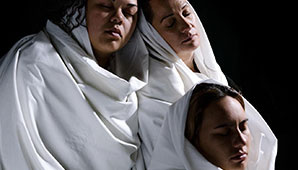TŪRANGA: THE LAND OF MILK AND HONEY
Lawson Field Theatre, Gisborne
09/10/2020 - 09/10/2020
Te Tairāwhiti Arts Festival 2020
Production Details
Questioning accepted narratives and exploring divisive issues.
In 2019, the Rongowhakaata Iwi Trust performed All Roads Lead to Ngātapa to full houses at the inaugural Te Tairāwhiti Arts Festival, an innovative devised production that explored the intricate history of Rongowhakaata, warts and all.
Their story resonated with audiences from different walks of life and had a profound impact throughout wider New Zealand.
This year, the Rongowhakaata Iwi Trust is back with a new piece entitled TŪRANGA: The Land of Milk and Honey, a groundbreaking devised production that dives deeper into our past, creates an atmosphere that questions accepted narratives and brings divisive issues to the forefront.
TŪRANGA: The Land of Milk and Honey is an exciting production that features the use of mixed media, music, visual projections, live artworks and youth voices. A piece that aims to propel our society into an equitable future.
Lawson Field Theatre
Friday 9th Oct 2020
2pm and 7pm
Adults $10 + fees
Children $5 + fees
BUY TICKETS
Theatre ,
1 hr
Stunning, in an honest, direct, very real way
Review by Beatrice Papazoglou 10th Oct 2020
Will you dig gardens, or dig graves?
This is the question which weaves its way through Turanga: Land of Milk and Honey. Sometimes the question is just a hinted at suggestion, like mist drifting over still water – and sometimes it is asked openly, insistently, like that water suddenly producing a massive wave ready to crash over our heads. It is always the right question.
Utilising beautifully shot and edited footage of Tairawhiti projected on a huge screen throughout the show, as well as local dialect and acknowledgements of whakapapa, this production boldly announces itself to be both from and serving the tangata whenua of this region. The audience, packed with all ages of whanau, friends, pakeke (senior members of the community), kuia and kaumatua, as well as Pākehā and tauiwi, sit enthralled and laser-focussed.
Together we are learning. We learn about history that has been swept under the rug through colonisation and the aftershocks thereof. We learn more about the desperate need to know and understand the truth of our past, how it affects the present, and how losing that knowledge will hurt both tangata whenua and all of us as a nation in the future.
This kind of work should happen all over the country and be required viewing for school students as one of the ways to truly open hearts and discussions about history, equity and justice in Aotearoa.
Turanga: Land of Milk and Honey focusses mainly on the female experience. We see three ‘ages’ of women before us: very young girls, teenagers in school-like clothing and fully grown women in a range of costumes, the most striking of which are modern takes on traditional style. All of these wahine are stunning, in an honest, direct, very real way. All look into the camera and therefore into us as though to say, “Who are you to deny my beauty and joy?” I am reminded of the poem ‘I, Too’ by Langston Hughes.
We are treated to eight ‘acts’, each named for a stage of a powhiri, and with salient titles. This gives a flow and purpose to the devised piece. We are not here to see a random collection of songs and characters, with no proper ending. In fact, we are brought full circle with a brief wananga at the end. House lights up, the full cast and directors on stage, the audience completes the circle. We are asked to briefly discuss our impressions, and then three people volunteer their thoughts.
One of them is an older Pākehā woman. She demands to know if anyone has actually heard people refer to a “woman’s chin tattoo as a WINZ barcode”, as was stated in the play. The majority of the audience, myself included, nods. I hated that question. But that question is exactly why we need more theatre like this – too many people in this country think that we have ample equity, equality, and a lack of racism, and it is simply not the case. Let’s stop digging graves and all become gardeners.
Copyright © in the review belongs to the reviewer





Comments